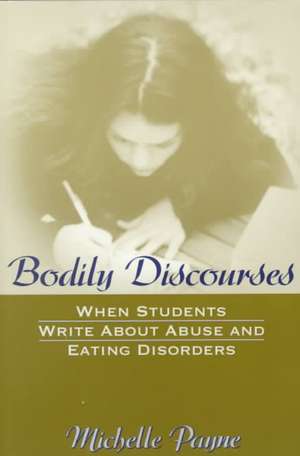Bodily Discourses: When Students Write about Abuse and Eating Disorders
Autor Michelle Payne, Payneen Limba Engleză Paperback – 29 feb 2000 – vârsta de la 18 până la 21 ani
At a northeastern university, a student turns in an essay for her writing course that uses her own experiences of being beaten by her boyfriend to argue for change in women's legal protection. Another student writes a research essay on child sexual abuse, describing her own abuse at the age of ten. In an advanced writing course, a student composes an essay on her addiction to hunger, her hospitalization, and her ultimate recovery from her obsession. "Bodily Discourses" is about these students. But it is also about how we interpret and respond to essays about bodily violence and the questions these responses raise about composition theory.
Some argue these topics have no place in the writing classroom, often assuming that only in expressivist classrooms will students choose to write about them. Payne looks closely at these responses and the anxiety behind them to offer a richly layered, provocative, and contextual analysis of both the student texts and composition theory - taking us into the texts these students write, their classrooms, and their interactions with students and peers.
"Bodily Discourses" is based upon a study that draws from twenty-five student essays, as well as interviews and ethnographic field work. It is the first book to move beyond teachers' typical concerns about how to respond and grade such "personal essays" to ask instead: "Why" are students writing about these subjects? "How" are they writing about them? What assumptions inform teachers' responses? What larger cultural contexts shape how such experiences are represented and understood by students and teachers? With each chapter, readers reexamine their own responses to these texts, discover a better way of reading and responding to them, and come to understand how students' writing about bodily violence challenges current debates about ideology, identity, and the teaching of writing.
Preț: 309.89 lei
Nou
59.30€ • 61.84$ • 49.29£
Carte indisponibilă temporar
Specificații
ISBN-10: 0867094710
Pagini: 192
Dimensiuni: 152 x 231 x 11 mm
Greutate: 0.27 kg
Editura: Heinemann Educational Books
Descriere
Some argue these topics have no place in the writing classroom, often assuming that only in expressivist classrooms will students choose to write about them. Payne looks closely at these responses and the anxiety behind them to offer a richly layered, provocative, and contextual analysis of both the student texts and composition theory - taking us into the texts these students write, their classrooms, and their interactions with students and peers.
Bodily Discourses is based upon a study that draws from twenty-five student essays, as well as interviews and ethnographic field work. It is the first book to move beyond teachers' typical concerns about how to respond and grade such "personal essays" to ask instead: Why are students writing about these subjects? How are they writing about them? What assumptions inform teachers' responses? What larger cultural contexts shape how such experiences are represented and understood by students and teachers? With each chapter, readers reexamine their own responses to these texts, discover a better way of reading and responding to them, and come to understand how students' writing about bodily violence challenges current debates about ideology, identity, and the teaching of writing.
Cuprins
It's Like It Never Even Happened: Situating Student Texts Within Discursive Traditions of Writing About Sexual Violence
"The Bruises Were Inside of Me": Writing the Hungry Body
"Sometimes I Just Want to Beat the Shit Out of You!" Anger and the Making of Knowledge in the Writing Classroom Conclusion: Listening
